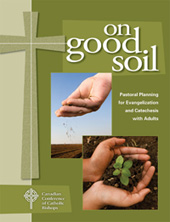
Providing insight, encouraging dialogue and renewing energy into an adult’s faith are integral components to a recently released publication from the Canadian Conference of Catholic Bishops.
The Bishops of Canada present On Good Soil: Pastoral Planning for Evangelization and Catechesis with Adults, which acts as a resource, offering new insight and direction to aid those engaged in evangelizing and catechizing adults in our day.
Director of the National Office of Religious Education, Joanne Chafe, says On Good Soil meets CCCB’s objective to provide guidelines on faith formation to Canadians.
“The CCCB has a long history of publishing documents to assist the community in adult formation,” she explains. “The universal church has a priority around adult faith, because adults are most responsible for living
out the gospel.”
With this in mind, On Good Soil: Pastoral Planning for Evangelization and Catechesis with Adults examines our current situation of culture and faith, and provides examples of best practices and effective initiatives that have been used in Canada and elsewhere. The reader will find instruction, help, affirmation and resources for their ministry.
It employs the experienced eyes of faith to offer a helpful, practical picture of our Canadian reality.
“This pastoral document deals with the soil of the culture, and how there is soil of different believers,” Joanne says. “It talks about how we can help the Good News reach each person, and that it’s not the same for everybody. There are multiple approaches and the pastoral document outlines how to make the teaching of the church relevant today.”
On Good Soil is divided into five parts.
Part One outlines the nature of evangelization and catechesis with adults in various stages, while Part Two explores how the five criteria for proclaiming the Gospel message within the Catholic community are reflected in good catechetical practice to our people. Part Three offers practical help with methodology, including examples of application. Part Four examines the practicalities of adapting evangelization and catechesis to various ages and circumstances in adulthood, and to different environments, cultures and challenges. Part Five focuses on the various roles needed for effective leadership, and offers some practical help for assessing needs and engaging in effective pastoral planning for evangelization and catechesis with adults.
Each section provides examples and suggestions for application.
“It’s a practical document,” explains Joanne. “It deals with the best practices and how-to guides, making it very dynamic.”
Readers will also encounter invitations to ponder and discuss, as well as pause and reflect. These opportunities for reflection and dialogue can assist the individual as well as groups that may be working through this resource together.
Each member of our Christian community, especially those who share in the responsibility for evangelization and catechesis with adults – including those who work with the Rite of Christian Initiation of Adults (RCIA), in dioceses and in parishes, in school boards, and in family, liturgy, chaplaincy, pastoral care and social justice areas – will find inspiration, sound direction and practical help in the pages of this guide.
The pastoral document provides a rich offering for educators.
“School boards are specifically mentioned among the targeted audience, and it outlines good orientations to help faith and life come together,” says Joanne. “This pastoral document helps with formation of teachers as catechists, and it says a lot about leadership development in the Church.”
On Good Soil would be of great interest and value to a number of leaders within the Christian community, including that of CCSTA.
*To order this pastoral document, please visit the CCCB Publications website at www.cccbpublications.ca.
Categories:


Leave a comment